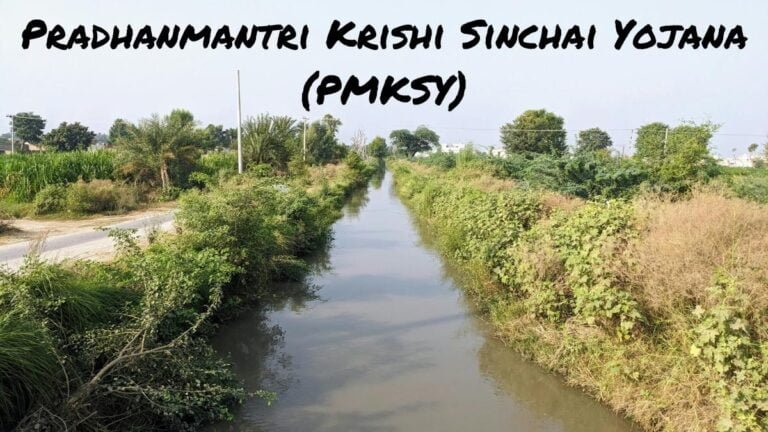The Pradhanmantri Krishi Sinchai Yojana (PMKSY) is a pivotal initiative introduced by the Government of India aimed at enhancing agricultural productivity and improving irrigation systems across the nation. Launched in 2015, this scheme addresses crucial challenges farmers face, primarily concerning water scarcity and inefficient irrigation practices. Recognizing that approximately 80% of agricultural land in India depends on rainfall, the PMKSY seeks to provide timely and adequate access to irrigation facilities, transforming farming into a more sustainable and profitable venture.
One of the primary objectives of the Pradhan Mantri Krishi Sinchai Yojana is to make irrigation available to every agricultural field in the country. The scheme promotes the adoption of modern irrigation techniques and efficient water management practices, which can lead to substantial increases in crop yields. By advocating for measures such as drip and sprinkler irrigation, PMKSY aims to not only conserve water but also enable farmers to cultivate cash crops, thereby enhancing their income potential. Additionally, the scheme emphasizes the necessity of participatory irrigation management, thereby engaging farmers in the planning and execution of irrigation projects.
The significance of the PMKSY extends beyond merely addressing irrigation requirements. By focusing on sustainable practices, the scheme contributes to environmental balance and agricultural resilience. Increasing productivity through efficient irrigation leads to reduced dependency on rain-fed agriculture, mitigating the impact of climatic fluctuations. Ultimately, the Pradhanmantri Krishi Sinchai Yojana seeks to empower farmers, ensure food security, and promote economic growth within the agricultural sector, thereby underlining its critical role in the overall development of India’s rural landscape.
Key Objectives of PMKSY
The Pradhanmantri Krishi Sinchai Yojana (PMKSY) serves as a pivotal initiative aimed at transforming the agricultural landscape of India. One of the primary objectives of this program is to increase irrigation coverage across the country. By extending the reach of irrigation facilities to previously underserved areas, the government aims to ensure that farmers have reliable access to water resources, which is fundamental for enhancing agricultural productivity. This expansion is essential in securing farmers’ livelihoods and supporting the farm sector’s overall growth.
Another critical focus of PMKSY is improving water-use efficiency. This encompasses promoting advanced irrigation techniques such as drip and sprinkler irrigation systems. By optimizing water use, the scheme aims to conserve this vital resource and ensure that crops receive adequate hydration, ultimately leading to better yields. Improved water efficiency is particularly significant in regions experiencing water scarcity, where traditional irrigation methods may be inadequate.
The initiative also emphasizes the importance of implementing rain-fed farming practices. By promoting techniques that enhance soil moisture retention and encourage the use of diversified crop systems, the PMKSY seeks to make rain-fed agriculture more sustainable. This approach is particularly beneficial for smallholder farmers who rely heavily on rainfall for their crops. It helps mitigate risks associated with climate variability, contributing to overall agricultural resilience.
Pradhanmantri Krishi Sinchai Yojana aims to enhance farmers’ income through sustainable agricultural practices. By improving access to irrigation and resource management, farmers can increase their productivity and, consequently, their income. The integration of sustainable practices in agriculture not only supports the economic well-being of farmers but also contributes to the long-term health of the environment.
Components of Pradhanmantri Krishi Sinchai Yojana
The Pradhanmantri Krishi Sinchai Yojana (PMKSY) is a pivotal initiative to enhance irrigation facilities across India, ultimately boosting agricultural productivity. This scheme comprises several components and sub-schemes, each designed to address specific challenges in irrigation management and water conservation.
One of PMKSY’s primary components is the Accelerated Irrigation Benefits Programme (AIBP). The AIBP focuses on completing incomplete irrigation projects, thereby increasing the cultivated area under assured irrigation. By accelerating the development of irrigation projects, AIBP aims to enhance the efficiency and reach of water supply, enabling more farmers to benefit from adequate rainfall and irrigation facilities.
Another critical component is the Command Area Development and Water Management (CADWM) scheme. This initiative concentrates on the holistic development of command areas associated with irrigation projects. It emphasizes efficient water management practices that facilitate optimal water use, improving crop productivity and sustainability. CADWM is instrumental in promoting advanced water management strategies and training farmers to use irrigation systems effectively.
Additionally, the PMKSY includes various supportive sub-schemes, such as Drip and Sprinkler Irrigation, which aim to promote modern irrigation techniques. These methods help conserve water, increase crop yield, and enhance agricultural productivity. Furthermore, the scheme integrates various other components like watershed development and rainfed area development, encouraging a multi-faceted approach to water resource management.
By consolidating these components, Pradhanmantri Krishi Sinchai Yojana effectively addresses the multifarious challenges faced by the agricultural sector. Collectively, these initiatives work toward building a robust irrigation network, ensuring sustainable agricultural practices and food security across the nation.
Eligibility Criteria for PMKSY Benefits
The Pradhanmantri Krishi Sinchai Yojana (PMKSY) is a significant initiative by the Government of India aimed at enhancing farmers’ irrigation facilities. To avail the benefits under this scheme, certain eligibility criteria must be met. This scheme primarily targets farmers, which includes both individual farmers and cooperative societies. It aims to support all categories of farmers, including marginal, small, and large-scale farmers, ensuring that the benefits are inclusive.
One of the critical components of eligibility under PMKSY is the landholding criteria. Farmers must possess agricultural land that complies with the regulations set forth in the scheme. The land must be legally owned and should be utilized for agricultural purposes. The farmers should be within the ceiling limits established for landownership under state-specific legislation. This provision guarantees that resources are directed towards those who genuinely require assistance, thus optimizing the aid provided for irrigation enhancement.
Documentation is another critical factor in determining eligibility for PMKSY. Farmers must prepare and submit several documents to facilitate the application process effectively. These typically include identity proof such as an Aadhar card, land ownership documents, and evidence of irrigation facilities currently in use. Furthermore, farmers may also need to provide a bank account statement for the disbursement of funds and other necessary documents indicating their agricultural activities. By ensuring that applicants fulfill these eligibility criteria, the PMKSY aims to streamline the process and provide meaningful support to the agricultural sector, thereby improving productivity and ensuring sustainable farming practices.
Application Process for PMKSY
The application process for the Pradhanmantri Krishi Sinchai Yojana (PMKSY) is designed to be straightforward, enabling farmers to access the benefits efficiently. To begin, farmers must approach their local agricultural office or department, which plays a critical role in guiding them through the application process. It is advisable for applicants to collect all necessary information about eligibility criteria prior to initiating the application.
Once eligible, farmers should complete the prescribed application form, which is available at the local agricultural offices or can often be downloaded from the government’s official website PMKSY. This form typically requires personal details, farm particulars, and information related to the irrigation system for which the assistance is being sought. In addition to the application form, applicants are required to submit documents that verify their identity, land ownership, and bank account details for fund disbursement. It is essential to ensure that all supporting documents are accurate and up to date, as discrepancies may delay the application process.
After the documentation is in place, applicants should submit their completed forms during the specified submission window. The timelines for submissions may vary each year. Hence, it is crucial to stay informed through announcements from local agricultural offices. Following submission, the local authority usually conducts a preliminary assessment, which may involve site visits to validate the information provided. Once approved, farmers will receive a notification confirming their eligibility for the Pradhanmantri Krishi Sinchai Yojana, along with details on the next steps. This streamlined process aims to enhance the benefits of irrigation and support the agricultural community effectively.
Funding and Financial Assistance in PMKSY
The Pradhanmantri Krishi Sinchai Yojana (PMKSY) is a significant initiative by the Government of India aimed at enhancing irrigation facilities across the country. A critical aspect of this program is its robust financial structure, which organizes funding from multiple sources to support its implementation effectively.
Financial assistance for PMKSY comes primarily from both the central and state governments, allowing for a collaborative approach to irrigation development. The central government allocates a substantial portion of the budget, which is crucial for assisting states in their efforts to improve agricultural productivity through coordinated irrigation efforts. Each state is responsible for determining the specific needs of its agricultural sector, leading to the tailoring of financial resources to meet local challenges.
Moreover, the PMKSY emphasizes the importance of partnerships with local bodies and stakeholders in the agricultural sector. By promoting the involvement of private and public entities, the program fosters greater accountability and efficiency in the utilization of funds. Farmers are encouraged to participate by submitting their proposals for financial aid, which streamlines the distribution of funds based on verified needs and project viability.
Various schemes under PMKSY, such as the ‘Micro Irrigation‘ scheme, have been established to ensure farmers receive specific financial support tailored to their irrigation requirements. The guidelines for financial assistance are designed to be transparent and accessible, ensuring that farmers can easily navigate the application process and secure the needed funds.
Overall, the Pradhanmantri Krishi Sinchai Yojana’s funding mechanisms play a crucial role in shaping the agricultural landscape in India. With proper financial backing, the yojana aims to create a more productive and sustainable farming environment while significantly improving the irrigation infrastructure across states.
Expected Outcomes of Pradhanmantri Krishi Sinchai Yojana
Implementing the Pradhan Mantri Krishi Sinchai Yojana (PMKSY) is anticipated to bring about several significant benefits, primarily aimed at improving agricultural productivity and promoting sustainable practices in the sector. One of the primary expected outcomes is a notable increase in crop yields. By enhancing irrigation facilities, farmers can cultivate a wider variety of crops more efficiently, thereby reducing dependency on rainfall and increasing food security throughout the nation.
Moreover, water conservation forms a critical pillar of the PMKSY initiative. The program encourages using advanced irrigation techniques, such as drip and sprinkler systems, which optimally manage water usage. By reducing wastage and ensuring that water is applied directly to the plants, farmers not only conserve this vital resource but also promote better crop health. This strategic approach to irrigation can ultimately lead to a more sustainable agricultural practice, which is increasingly important in the context of climate change and fluctuating water availability.
Furthermore, by integrating sustainable agricultural practices, PMKSY aims to contribute to the overall economic upliftment of rural communities. With improved irrigation infrastructure, farmers are likely to see increased income levels due to higher productivity and reduced crop loss. Additionally, the program promotes community engagement and training, helping farmers adopt modern agricultural techniques. This holistic approach not only enhances the economic viability of agriculture but also improves the quality of life in rural areas, fostering development across multiple dimensions.
As the Pradhanmantri Krishi Sinchai Yojana continues to be implemented, stakeholders in the agriculture sector can expect to witness a shift toward more resilient farming practices, ultimately leading to increased prosperity and sustainability in rural India.
Challenges and Limitations of PMKSY
The Pradhanmantri Krishi Sinchai Yojana (PMKSY) aims to promote efficient water usage for enhancing agricultural productivity but faces several challenges that may undermine its success. One significant hurdle involves bureaucratic inefficiencies. The implementation of PMKSY requires coordination among various governmental departments, and delays can occur due to red tape. These administrative bottlenecks can hinder timely project approvals and resource allocation, leaving farmers unable to benefit from the irrigation improvements intended by the scheme.
Another critical limitation is the need for more awareness among farmers regarding the PMKSY’s objectives and benefits. Many small and marginal farmers, who stand to gain the most from this initiative, remain uninformed about the scheme’s provisions, application processes, and the ways in which it can enhance their livelihoods. This gap in knowledge can lead to underutilization of available resources, rendering the program less effective in achieving its overarching goals of improving irrigation and agricultural sustainability.
In addition to awareness issues, infrastructure deficiencies present a considerable challenge to the successful implementation of PMKSY. Many regions suffer from inadequate irrigation infrastructure, which can limit the uptake of new measures introduced by the scheme. For instance, in areas where existing canal systems could be better maintained, even well-planned projects may fall short of their intended outcomes. Furthermore, limited access to modern irrigation technologies can further exacerbate the situation, resulting in uneven benefits across various agricultural regions.
Recognizing these challenges is essential for stakeholders involved in the PMKSY. By addressing bureaucratic hurdles, enhancing awareness among farmers, and improving infrastructure, the potential of the Pradhanmantri Krishi Sinchai Yojana can be fully realized, leading to improved agricultural productivity and sustainability. In conclusion, overcoming these obstacles will be crucial for the long-term success of the PMKSY initiative in India.
Case Studies and Success Stories from PMKSY
The Pradhanmantri Krishi Sinchai Yojana (PMKSY) has made significant strides in transforming agricultural practices across India, and several case studies illustrate its impact on farmers’ livelihoods. One notable example is a group of farmers in the drought-prone district of Solapur, Maharashtra. These farmers, facing severe water scarcity, adopted micro-irrigation techniques supported by PMKSY, which allowed them to optimize their water usage. By utilizing drip irrigation systems, they not only conserve water but also increase their crop yields, improving their economic stability and food security.
Another success story comes from the state of Punjab, where smallholder farmers engaged in paddy cultivation benefited immensely from the scheme. Through PMKSY, the farmers received subsidies for modern irrigation facilities, which replaced traditional flood irrigation methods. As a result, they reported a reduction in water usage, leading to environmental benefits as well as enhanced productivity. This shift in agricultural practices yielded higher profits and fostered sustainable farming methods.
Furthermore, a cooperative of cotton farmers in Gujarat embraced PMKSY initiatives, transforming their approach to farming. By implementing rainwater harvesting systems, the cooperative members could store and use rainwater efficiently throughout the year. This successful adaptation of the irrigation scheme has decreased their dependency on groundwater and empowered them to withstand erratic weather patterns. The financial gains from enhanced cotton production have allowed the cooperative to invest more in community welfare and education.
Must Read: Pradhan Mantri Fasal Bima Yojana (PMFBY) is another beneficial scheme started by the Indian government to benefit farmers nationwide.
These case studies exemplify the positive impact of the Pradhanmantri Krishi Sinchai Yojana on farmers across diverse regions. Farmers have enhanced their productivity and sustainability by adopting innovative irrigation practices and technologies. The scheme’s implementation has thus played a vital role in transforming agricultural practices, showcasing a promising future for Indian agriculture.


